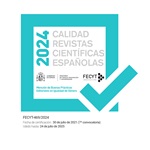Sepúlveda y la Historia oficial: Dos sucesos polémicos desde la óptica de un cronista regio. (RI §412975)

Sepúlveda and the official history: two polemics events from the point of view of a royal chronicler -
Jesús Ángel Cabezas Estrada
Este trabajo se centra en la producción historiográfica de Juan Ginés de Sepúlveda. Partiendo de la inserción en el ámbito de la historia “oficial” de las obras que escribió en calidad de cronista regio, analizo dos sucesos controvertidos que tuvieron lugar durante el transcurso de los reinados de Carlos V y Felipe II: el Saco de Roma (1527) y la guerra contra el Papa Paulo IV (1556-1557), recogidos por Sepúlveda en el De rebus gestis Caroli V y en el De rebus gestis Philippi II, respectivamente. Incido en la versión que el pozoalbense aporta sobre estos acontecimientos, prestando atención a la caracterización que hace de la Monarquía Hispánica y de sus antagonistas (los papas Clemente VII y Paulo IV y los reyes Francisco I y Enrique II, en este caso). Asimismo, analizo la justificación que lleva a cabo de estos sucesos a partir de sus consideraciones sobre la guerra justa, expuestas en el Democrates Secundus.
I. Introducción. II. La historia oficial: Ginés de Sepúlveda y el oficio de cronista. III. Las causas justificativas de la guerra. IV. El asalto a la Ciudad Eterna. 4.1. Circunstancias de la obra. 4.2. Causas del Saco. 4.3. El desastre, sin censura. 4.4. La responsabilidad del suceso. 4.5. Los alemanes en el Saco. V. Un enemigo de España en el trono de San Pedro. 5.1. Circunstancias de la obra. 5.2. El conflicto y su problemática moral. 5.3. La presentación negativa de los antagonistas. 5.4. La confiscación de territorios como casus belli. 5.5. La moderación en la guerra. 5.6. ¿Omisión interesada? VI. Consideraciones finales.
This essay is focused on the historiographic production of Juan Ginés de Sepúlveda. From insertion of the works that he wrote when he was royal chronicler in the area of official history, I analyze two complex events that occurred during the reigns of Charles V and Philip II: the Sack of Rome (1527) and the war against the Pope Paul IV (1556-1558), both were included in De rebus gestis Caroli V and De rebus getis Philipi II, respectively by Sepúlveda. I stress the version of these events that he provided, paying attention to the characterization that he realized of the Hispanic Monarchy and its opponents (in this case, the popes Clement VII and Paul IV, and the kings Francis I and Henry II). I also analyze the justification that Sepúlveda realized of these events from his considerations of the just war, that are in Democrates Secundus.
I. Introduction. II. The official history: Ginés de Sepúlveda and the office of chronicler. III. The reasons justifying the war. IV. The storming of the Eternal City. 4.1. Circumstances of the work. 4.2. Causes of Saco. 4.3. The disaster, uncensored. 4.4. The responsibility of the event. 4.5. The Germans on the Saco. V. An enemy of Spain on the throne of St. Peter. 5.1. Circumstances of the work. 5.2. The conflict and moral issues. 5.3. The negative presentation of the opponents. 5.4. The confiscation of territories as casus belli. 5.5. Moderation in war. 5.6. Interested Omission? VI. Final considerations.

 DIRECTORA
DIRECTORA